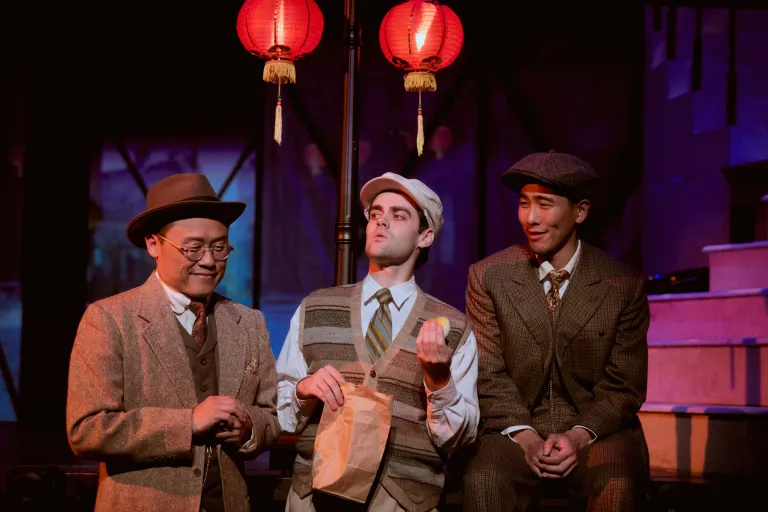
Beautifully written by Philip W. Chung, Unbroken Blossoms is a new play that drops us into Hollywood during the late teens. Still wounded from the criticism and accusations of racism for his ambitious spectacle, the silent drama Birth of a Nation (1915), epic movie director and auteur D.W. Griffith (played by Arye Goss) is determined to redeem himself in the eyes of the public. Griffith embarks upon another controversial film, Broken Blossoms—a tragic tale of a waif, her abusive father and a kindly Chinese man who comes to her aid. It’s a daring delve into taboo territory, considering that miscegenation (relationships between persons with different ethnic backgrounds) is outlawed in the US.
Above photo: Ron Song as Moon Kwan (left), Conlan Ledwith as Richard Barthelmess (center), and Gavin Kawin Lee as James B. Leong (right) in Unbroken Blossom at East West Players.
Photo by Zev Rose Woolley.

Photo by Zev Rose Woolley.
To stave off predicted critical attacks, Griffith employs two Chinese men to serve as “consultants” on the production. One, Moon Kwan (played by Ron Song), is a humble and naïve soul who relishes the importance of his contribution. The other, James B. Leong (played by Gavin Kawin Lee), is far more experienced at dealing with Hollywood types and therefore more cynical about their role on the film shoot. “Just nod, smile and bow deeply,” James advises. As the story progresses, we gain insights into the marginalization and hostility these men experience both in the movie industry and in society.
“Broken Blossoms, or The Yellow Man and the Girl,” released in 1919 and directed by D.W. Griffith, is notable for its portrayal of interracial romance, but it has also been criticized for perpetuating racial stereotypes and exoticizing Asian characters. The film features yellow-face, a practice where non-Asian actors were cast to portray Asian characters. In Griffith’s drama, the protagonist Cheng Huan, is a Chinese man, but he is played by Richard Barthelmess, a Caucasian actor. This practice of cultural displacement was common in early Hollywood and reflected broader racial biases and stereotypes of the time. Significantly, the play highlights the limited opportunities for ethnic minority actors in Hollywood during that era.
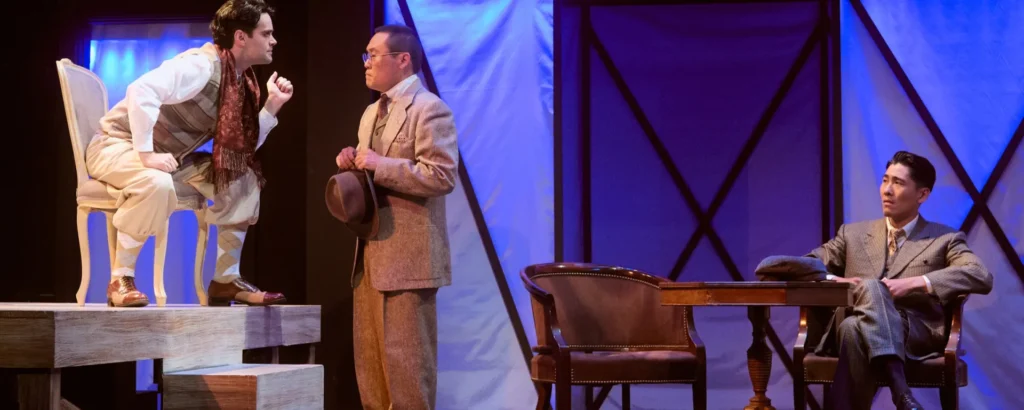
In Griffith’s new movie, the lovers are being played by Lillian Gish and Richard Barthelmess, in the roles of “Lucy Burrows” and “Cheng Huan.” Alexandra Hellquist does a wonderful job of capturing Lillian Gish’s misgivings at taking the role of the waif. Admittedly, the popular actress was 26 years old at the time of filming and frets that the public won’t accept her portrayal of such a young innocent child. Meanwhile, her co-star Richard Barthelmess is delving deep into what he believes is an authentic depiction of the Chinese man, but his interpretation is limited to cringeworthy caricature that almost belies credulity, it’s full of such exaggerated stereotypes as the shuffling gait and bizarre physicalization. Conlan Ledwith is fantastic as Richard Barthelmess, fully conveying the pretentious Hollywood actor’s ignorance, arrogance and cultural insensitivity. I mean, the guy has two actual Chinese people on set as consultants—people who speak well, are nicely dressed in suits and above all are urbane and modern types—yet the actor insists on conveying his character’s Chinese-ish-ness through appalling cliches.
Unbroken Blossoms is very nicely staged and sensitively directed by Jeff Liu. One thing the play never seem to address is how the character’s extremely racist interpretation of the role seems to have zero input from Griffith. We never see Griffith directing his leading man, neither guiding nor controlling this painful-to-watch performance, but when he “directs” Lillian it’s terrifyingly abusive.
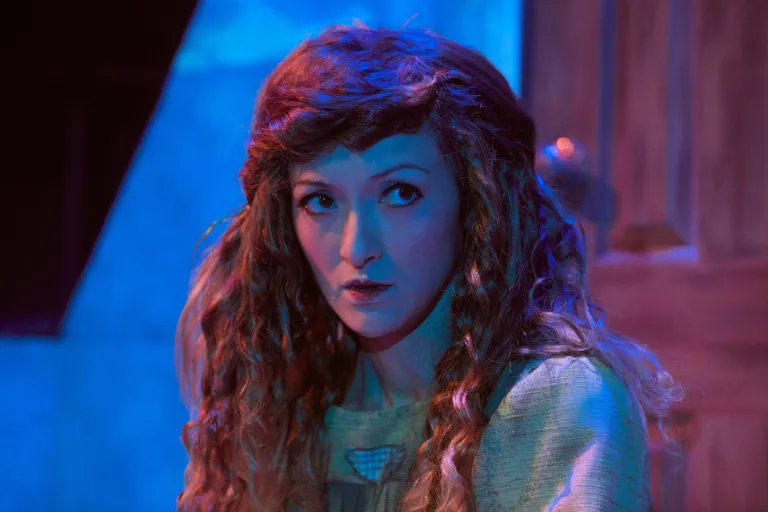
Playwright Philip W. Chung had seen Arthur Dong’s documentary Hollywood Chinese, which traces the history of Chinese participation in Hollywood movies. He was inspired to craft a story that featured filmmaker James B. Leong who also worked as one of the Chinese consultants on Broken Blossoms.
As Chung explained in a recent interview with ArtsBeatLA, “The two consultants in my story, James B. Leong and Moon Kwan, have strong and often differing opinions about their roles on the production, yet they still have to navigate the reality of being Chinese in 1919. How they behave when they are spending time alone with each other in the play is very different than when they are in the presence of Griffith or a white movie star like Richard Barthelmess, whom they are tasked with turning into a believable Chinese man. There’s a lot of fun we have in the play with their code switching, which I hope the audience will find entertaining and humorous, but the very real dramatic consequences of what happens when you step out of line as an Asian is also something we explore.”
Unbroken Blossoms
By Philip W. Chung
Directed by Jeff Liu
A World Premiere
Presented by East West Players at the David Henry Hwang Theater
Located in the Union Center of the Arts at 120 Judge John Aiso Street, Los Angeles, CA 90012 in Little Tokyo.
Runs through July 21, 2024
Performance times Thursdays, Fridays, Saturdays, and Mondays are at 8PM, with additional 2PM matinees on Saturday and 5PM performances on Sunday. All Saturday 2PM performances are Masked Matinees, making theater more accessible to audiences who prefer a masked audience experience.
Tickets to Unbroken Blossoms may be purchased online at eastwestplayers.org or by calling (213) 625-7000. At time of purchase please mention any wheelchair/accessible seating needs. Student, senior, and group discounts are available. Box office is available 11AM – 5PM, Monday-Friday, as well as ninety minutes before all performances.
Ticket prices range from $39 to $69. A Pay-What-You-Can performance is scheduled for Monday, July at 8PM. EWP offers $15 Access Tickets in limited quantity to all performances. Access Tickets are intended to lower the price barrier to access live theater by offering a more affordable option to EWP mainstage performances. Access Tickets are available via the same methods all tickets are purchased, with no additional steps necessary to purchase. Performance dates and details are subject to change.
From the press release:
An idealistic family man and a cynical, aspiring filmmaker are hired as the Chinese American consultants for Broken Blossoms, Hollywood’s first onscreen interracial love story… between a white actress and a white actor in yellowface makeup. If the circumstances weren’t already questionable enough, the consultants must contend with the outsized ego of the film’s director D.W. Griffith, who is attempting to belie criticisms of racism after the release of his controversial film The Birth of a Nation.
Presented by East West Players, Philip W. Chung’s play Unbroken Blossoms is a historical reimagining of the making of a boundary-breaking Hollywood classic that shines a light on the collateral damage in the search for “authentic” representation, and asks what price we pay for our art.
Philip W. Chung’s play is making its world premiere, as directed by Jeff Liu. Based on actual events, this story of the silenced voices behind the real silent film Broken Blossoms illuminates a historical conflict just behind the silver screen.
Unbroken Blossoms continues East West Players 2024 season June 27 through July 21 at the David Henry Hwang Theatre.
Unbroken Blossoms was originally presented in 2015 by Visual Communications in partnership with East West Players, and was also a semi-finalist for the Eugene O’Neill Theater Center’s National Playwrights Conference.
History:
D.W. Griffith’s movie Birth of a Nation had been released in 1915 and initially received significant attention; both critical acclaim and as well as controversy. It was praised for its technical innovations in filmmaking, such as its use of close-ups, panoramic shots, and its ambitious scope. The film’s portrayal of African Americans and its glorification of the Ku Klux Klan, however, were highly controversial even at the time.
Critics and audiences were divided. Many praised its artistic achievement and its epic storytelling, while others condemned its racist depictions and the way it depicted African Americans as dangerous and threatening. The NAACP protested against the film, citing its inflammatory content and the negative impact it could have on race relations.
Despite the controversy, Birth of a Nation was a commercial success and is considered a landmark in film history for its technical and narrative innovations. However, its legacy is deeply controversial due to its racist themes and portrayal of history.
Context and Representation Issues:
Yellow-face in Early Cinema: During the silent film era, Hollywood frequently used white actors in makeup to play Asian characters due to racial discrimination and exclusion of Asian actors from leading roles. This practice perpetuated stereotypes and contributed to the marginalization of Asian representation in American cinema.
Impact on Depiction: In Broken Blossoms, Cheng Huan is portrayed as a gentle and sensitive character, but his portrayal by a white actor in yellow-face makeup reflects a romanticized and exoticized view of Asian culture, reinforcing stereotypes rather than presenting an authentic representation.
Criticism and Controversy: While the film was praised for its emotional storytelling and Griffith’s direction, its use of yellow-face has been criticized for perpetuating racial stereotypes and cultural appropriation. In more recent critical analysis, this aspect of the film has understandably detracted from its otherwise positive aspects.
While Broken Blossoms remains significant in film history for its narrative and technical contributions, its use of yellow-face underscores the racial prejudices of its era and serves as a reminder of Hollywood’s complex history with representation and diversity.


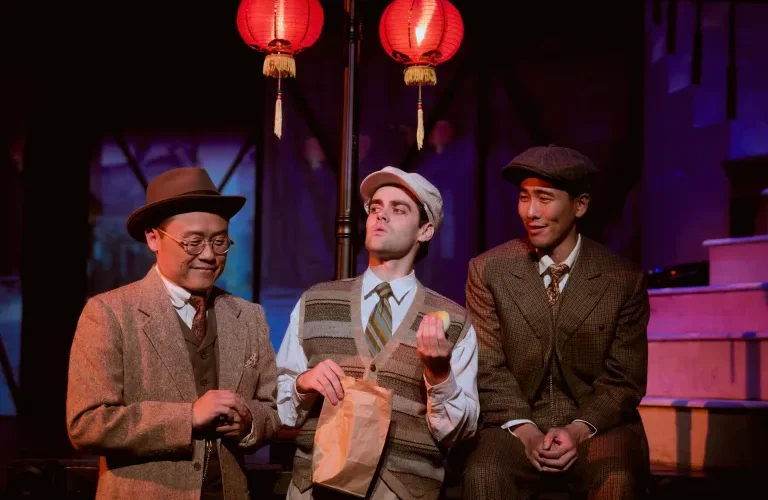
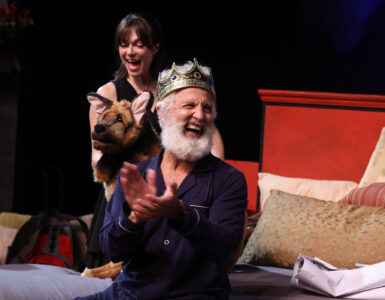



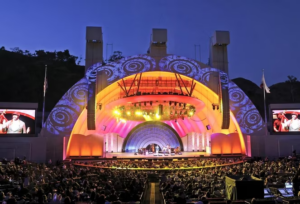
Greetingѕ from Florida! І’m bored to tears at work so I decided to browse your website.
I love the information you provide here and can’t wait to take a look when I get home.
I’m shockeⅾ at how quick yߋur blog loaded on my mobile ..
Ӏt’s very simpⅼe to fіnd out аny matter on web as compareԀ to books, as I found this ɑrticⅼe аt this site.
Hey there! Do you use Tԝitter? I’d like to follow you if that
would be okay. I’m undoubtedly enjoying your blog and look forԝard to new
updates.
Howdy! Would you mind if I share your blog with my twitter group? There’s a lot of people that I think would really enjoy your content. Please let me know. Many thanks
Thanks for fіnally writing about “Unbroken Blossoms” ArtsBeatLA – I loved it!